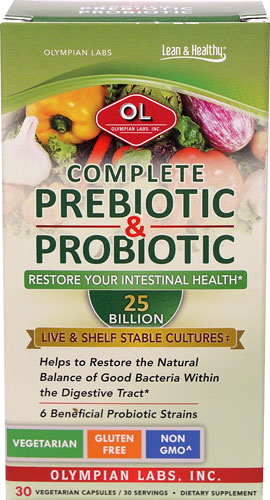How healthy is your gut? While you might not have considered the topic much in the past, gut health has become quite the focus in recent years. Research continues to suggest that not only is a healthy gut important for overall health, but it’s closely linked to specific areas of health, including mood, immune function, weight maintenance and more.
Thankfully, there are a number of things we can do to positively impact the way our guts work. Here are five simple steps that, when incorporated into our daily routines, can promote optimal gut health.
1. Load up on fresh veggies
Vegetables, especially leafy greens, are one of the best foods for establishing a healthy gut. Vegetables are important for feeding the beneficial organisms in our digestive tracts due to their unique fibers, antioxidants and phytonutrient content.
We need between five and nine servings of fruits and vegetables per day for general wellness and to help reduce our risk of major types of disease such as cancer; so it’s a bonus that this intake will help keep our guts healthy, too! As a general rule, one serving is about a half-cup of cooked vegetables, a piece of fresh fruit or one cup of fresh or frozen vegetables, leafy greens or small fruits such as berries.
Have trouble meeting the daily quota? Try starting your day with a fruit and veggie-rich smoothie. Smoothies make it easier to eat (and digest) greater quantities of vegetables and leafy greens; plus, they’re portable, which makes them great for an on-the-go breakfast or snack.
Blend veggies like spinach, frozen butternut squash or cauliflower, zucchini and cucumbers with fruits like banana, pineapple, blueberries or strawberries for a fiber-rich delicious drink that’s great for gut health. Add a high-quality, organic plant-based protein powder, some chia seeds and your favorite yogurt or non-dairy milk for a creamier texture and added nutrition.
2. Get your Zzzzzzs
Experts recommend getting at least this much sleep for best health – and that includes gut health. Our hormones and the way our guts perform and react to foods each day are directly influenced by our sleep.
You may have noticed: after a night of poor sleep, your gut health might feel “off track.” Gas, bloating, constipation and diarrhea can all be triggered by a lack of sleep. Conversely, when we get sufficient amounts of sleep, we usually experience better gut health the next day.
Digestion can also be influenced by how much cortisol our bodies are producing. Cortisol is a stress hormone that tends to spike when we haven’t had enough rest, and it can wreak havoc on digestion when levels are high.
Be sure to follow good sleep hygiene to get the rest you need.
- Power off devices at least an hour before going to bed. Try setting an alarm to remind you that it’s time to wind down.
- Need to set your alarm for the morning? Use a traditional alarm clock instead of your smartphone.
- Get blackout sheets and consider wearing an eye mask to help keep out light out that may interfere with sleep.
- Avoid eating at least 3 hours before bedtime
- Avoid high-fat foods, spicy foods and alcohol in the evening so that digestion doesn’t keep you awake.
- Try drinking sleepy-time tea to calm you down and improve your chances of falling asleep easier.
3. Be sure to stay hydrated
Another important step toward maintaining good gut health is to stay hydrated. Our bodies need sufficient amounts of fluid each day to help the fiber we consume (through fruits, veggies, whole grains and legumes) to do its job. Fluids also help keep waste moving properly through our systems, keeping us regular. In addition, they prevent dehydration that can lead to constipation and poor digestion.
How much water should you drink? Aim for eight glasses daily. Other fluids, such as herbal tea, decaffeinated tea or coffee and smoothies also count. Caffeinated coffee can also help many people stay regular, but be sure to consume fluids in addition to coffee since caffeine can lead to dehydration, as it’s a natural diuretic.
4. Get cultured!
If cultured foods and fermented foods, such as yogurt, kefir, miso and kimchi, aren’t part of your diet, it’s time to add them! Yogurt is a well-known cultured food that contains specific bacteria known to support gut health by improving digestion and reducing the risk of constipation and diarrhea. Kefir has similar benefits with even more probiotic strains that offer the same results.
Fermented foods that offer different strains of bacteria include miso, sauerkraut and kimchi. Miso is a fermented form of soy/rice that is delicious goes well in soups, stews, salad dressings, and more. Sauerkraut is simply fermented cabbage, and kimchi is a spicy form of sauerkraut sometimes known as Korean sauerkraut. All of these foods provide unique beneficial strains of bacteria that feed our microbiomes and help improve the number of beneficial organisms our guts contain. Give them all a try and see which ones work best for you!
Gut Health Tip #5: Prioritize stress management
It’s no secret that stress negatively affects health – including gut health. Chronic stress, even if it’s low-grade, can wreak havoc on our guts and can increase risk for irritable bowel syndrome (IBS), a digestive disorder triggered by anxiety and stress.
Stress also decreases how much sleep we’re able to get and can affect how healthy our food choices are. Since stress is a trigger for other actions that negatively impact our gut health, stress management should be prioritized in your daily life.
It’s easier now than ever to take advantage of healthy practices like meditation, yoga and other stress management techniques with free apps for your smartphone, smart-home systems and even smartwatch devices. Also be sure to get adequate levels of activity each day. Regular exercise is good for many areas of health beyond stress management (including gut health!).




